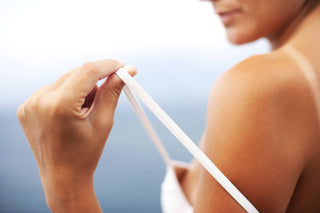Be honest. Do you apply sunscreen every day to protect your skin from the sun’s harmful rays? As you head out to the beach, lake or pool this summer, will you be doing what dermatologists recommend in terms of how much and how frequently to apply sunscreen?
If you’re like most of us, chances are the answer to both these questions runs in the negative. Between the messiness of liquid sunscreens, the unpleasant greasy layer underneath your makeup, and the simple inconvenience of having to remember to reapply while you’re out and about, following doctor’s orders is often neither easy nor practical.
At the same time, you know that ultraviolet light causes your skin to age more rapidly, not to mention promoting the development of melanoma – a type of skin cancer that can be deadly.
So what’s the solution? Boost your skin’s natural defenses with food!
That’s right; you can actually increase how well your skin withstands UV radiation, and even reduce the inflammation of sunburns, by eating more foods rich in the carotenoid lutein.
What is Lutein?
Lutein is a phytonutrient contained in dark green and yellow veggies that is deposited in the skin and protects against UV damage. You may have heard of lutein along with another carotenoid called zeaxanthin for its role in eye health. These two phytonutrients are deposited in high amounts in the macular portion of the eyes to protect them from oxidative stress.
In a similar fashion, studies have shown the antioxidant abilities of lutein can help fight free radical damage from sun exposure. When present in sufficient quantities in the skin, lutein assists in filtering high-energy wavelengths of light which slows down the rate of oxidative stress. The result is significant protection against photodamage including sunburn, signs of aging and potentially even skin cancer.
An added benefit of consuming more lutein and other carotenoids as found in a study by the British journal Evolution and Human Behaviour is an increase in skin yellowness, allowing you to gain that healthy glow without the harmful consequences of tanning.
How Much Should I Take?
Despite these advantages, there currently is no official recommendation for the daily intake of lutein, so the question remains: how much do you really need? Suggested dosage amounts range from 6 to 30 milligrams depending on whether an individual is eating plenty of fruits & veggies or not.
Certain groups with poor nutrient absorption including older adults, smokers and post-menopausal women may need to supplement in higher doses. But on average, most studies show the greatest benefits are to be had by consuming 10 milligrams of lutein per day.
The good news is there are plenty of lutein-rich foods to choose from, especially during the abundant summer season. One cup of raw kale, for example, provides 22 milligrams. If you opt for a lutein supplement such as VitaMedica’s Phyto-5 Phytonutrient Complex, you’ll also want to be sure to take it with food. Lutein acts like a fat-soluble nutrient and is better absorbed when eaten with meals, especially omega-3 foods.
Excellent sources of lutein are to be found in egg yolks and in the same brightly colored fruits and vegetables that are packed full of various phytonutrients, each with their own health benefits, as well as the essential vitamins and minerals your body needs to look and feel your best.
Here are some of our favorites:
Bottom Line
Consuming more lutein can help protect your skin from harmful UV rays, but is no substitute for convention. The ideal and most effective way to protect your skin from the sun is a bi-directional approach that uses foods to boost your skin’s internal UV resistance, along with external methods of covering up. So before you step outside this summer, remember to grab your hat, lather up the sunscreen, and load up on lutein for healthy, stress-free fun in the sun.




